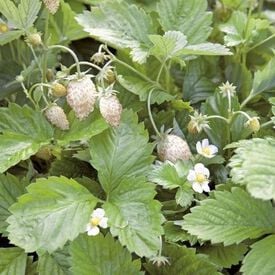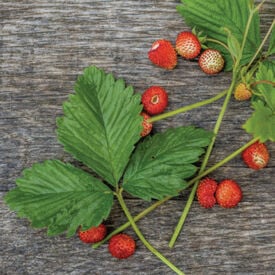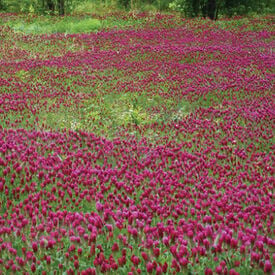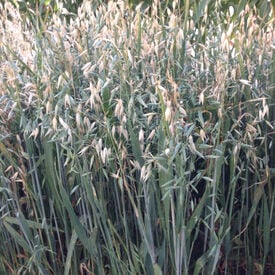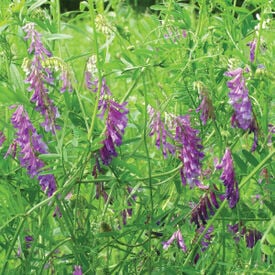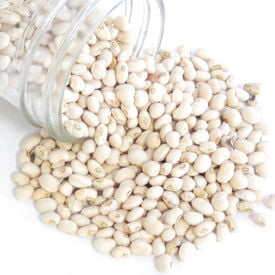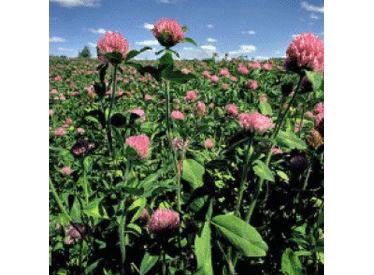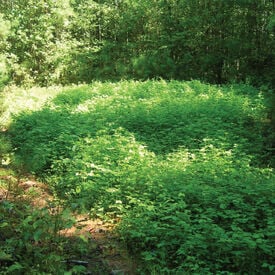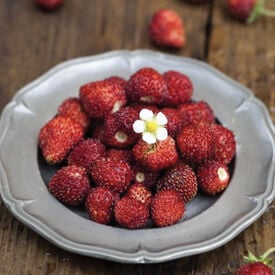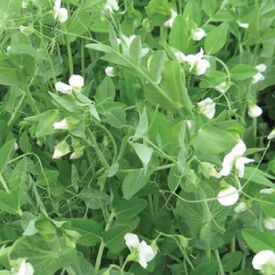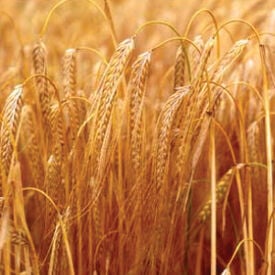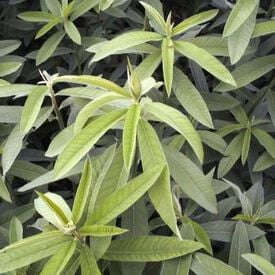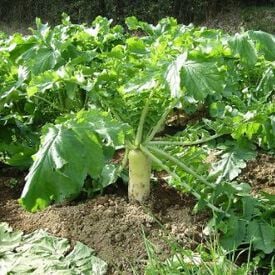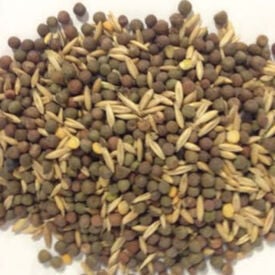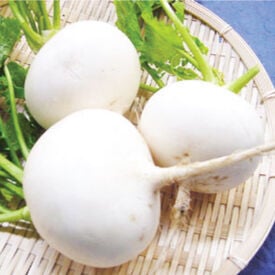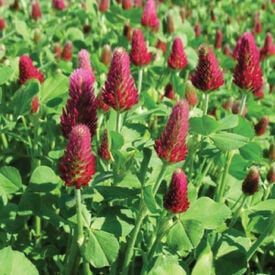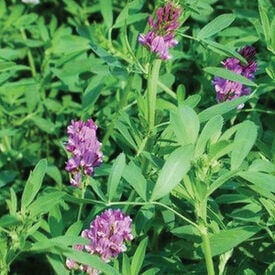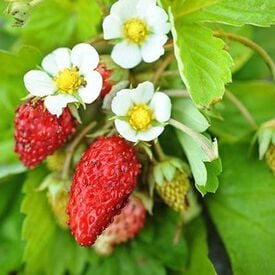'White Solemacher' (Also known as Weiss Solemacher) is a white fruiting alpine strawberry cultivar that has been around for many years. It was discovered in Germany. The fruit is among the largest white fruit produced by alpines. It is a clumping type (few to no runners) and is day neutral which means it is not dependent on day length for flowering. The white fruit has the distinctive wild strawberry flavor and aroma expected from fraises des bois. The fruit has a hint of pineapple flavor typical of white alpine fruit. We like it that birds don't seem to know the fruit is ripe and so it Fools the Birds and a part of the collection by that name.
Fragaria vesca var. vesca, aka Woodland Strawberry, has white flowers and small, very flavorful crimson berries. This everbearing alpine strawberry will produce fruit all summer long.
The Medium Red Clover is fast to establish and can be grown in most soil types as well as sowed in spring, summer or fall! This clover works well for hay or silage. The Medium Red Clover can be used as a cover crop between rows of vegetable crops if mowed to maintain manageability. This clover can fix up to 150 lb. of nitrogen per acre. Uses: Bees & Beneficial Insects, Chicken Forage, Compaction Control, Deer Attractant, Erosion Control, Forage, Green Manure, Nitrogen Fixation, No Till, Weed Suppression
The Jerry Oats is a grain that is a quick growing green manure that will kill off any winter weeds and will hold soil with a mat of vegetation! This high yielding oat can produce over 100 bushels per acre. This grain variety is great for garlic beds and other vegetables. The oats stay green into November and form a mulched bed for spring planting. The Jerry Oats are also great for underseeding with a legume. Uses: Erosion prevention, Green Manure, Nitrogen Scavenger, No Till, Organic Matter, Weed Suppresion
When sown late summer, the Hairy Vetch spring regrowth is vigorous and nitrogen-producing, for tilling in before planting spring garden crops. You can sow with or without grain, grass or field peas! The typical nitrogen produced of this legume is 100 lbs. per acre. The Hairy Vetch has rapid growth that makes it a good weed suppressant. Uses: Bees & Beneficial Insects, Chicken Forage, Deer Attractant, Erosion Control, Forage, Green Manure, Nitrogen Fixation, No Till, Weed Suppression
The Texas Cream is a heavy yielding Southern cowpea that is great for fresh shelling. This variety is very similarly to 'Sadandy' but the cowpeas are slightly larger. These bush-type plants are prolific and thrive in hotter, Southern weather. Texas Cream is a "cream pea" type variety, they are generally used at the fresh shelling stage. Treated Seed.
The Mammoth Red Clover is a large, fast growing clover that is an ideal grazing crop and can be sowed in spring, summer or fall! Mammoth Red is a popular biennial clover used for Nitrogen addition and hay crops. This red clover may be the best choice for frost seeding; it is extremely cold hardy and does well in most soils and growing conditions. The Mammoth Red Clover will fix up to 70-110 lbs. nitrogen per acre. This variety's long tap roots loosen soils and mine phosphorus and other nutrients from deep in the soil. Uses: Bees & Beneficial Insects, Chicken Forage, Compaction Control, Deer Attractant, Erosion Control, Forage, Green Manure, Nitrogen Fixation, No Till, Weed Suppression
All of the seeds below are very good at attracting deer to your property! Buckwheat - Improves top soil and an effective choke weed! Plant late spring to early summer. Establishes quickly. Matures in 60 days. Accumulates phosphorus and and potassium for following crops. Frost sensitive. All below packages come in 1lb. bags. Crimson Clover - Winter annual protects and improves soil! Plant fall or early spring. A good nitrogen fixer (70-150 lbs per acre per year). Showy crimson blooms in late spring are an excellent source of nectar for bees. Inter-seeds well with grass. Austrian Winter Pea - A great cool season legume for cover crops, wildlife and winter grazing! Austrian winter pea, sometimes called "black pea" and "field pea" is a cool-season, annual legume with good, nitrogen-fixing capabilities. Austrian winter pea is a low-growing, viny legume which has been shown to fix over 200 pounds of nitrogen per acre per year. Peas - Grow regular old peas in your deer food plot. One of the most preferred vegetables for deer. Oats - Oats will kill off winter weeds and hold soil with a mat of vegetation! A high yielding oat that can produce over 100 bushels per acre. Plant anytime of the year. Deer will graze oats all year round. Barkant Forage Turnip - Great forage crop that provides high energy feed! Barkant turnips are an improved, early maturing, diploid turnip wtih a large purple tankard shaped bulb. Barkant turnips have a high leaf to stem ratio and and provide very high contentrations of protein, sugar content and leaf yields. Barkant Turnips are ideally suited for wildlife. Dwarf Essex Rape - A cabbage related plant that is a perfect grazer! Dwarf Essex Rape is a perfect grazer plant that will persist well after the first frost. Ready to pasture 6-8 weeks after sowing. Hairy Vetch - Sow with or without grain, grass or field peas! When sown late summer, grows fast and will attract wildlife. Hairy Vetch has rapid growth that makes it a good weed suppressant.
Improved Rugen is a delicious alpine strawberry. Produces strong, upright plants that are great for rock gardens, border plantings and edible landscapes. Rugen produces smaller, elongated red berries with a sweet flavor. First grown over 250 years ago in France, these Alpine natives grow well in either sun or shade.
The Austrian Winter Pea, sometimes called black pea or field pea, is a great cool season legume for cover crops, wildlife and winter grazing! This cool-season, annual legume has good, nitrogen-fixing capabilities. The Austrian Winter Pea is a low-growing, viny legume which has been shown to fix over 200 pounds of nitrogen per acre per year. It has hollow, slender and succulent stems, 2 to 4 feet long. The foliage is pale green, and the flowers are colored, usually purple, pink or reddish. Uses: Chicken forage, deer attractant, forage, green manure, nitrogen fixation, no till, organic matter (biomass), weed suppression
The Thoroughbred Barley is a widely adapted variety of barley that is high yielding, with a great straw strength and a high test weight. This grain is a good standing six-rowed barley. This variety is resistant to powdery mildew and barley yellow dwarf virus. Uses: Bees & Beneficial Insects, Erosion Control, Green Manure, Nitrogen Scavenger, No Till, Organic Matter (Biomass), Weed Suppression
The Sunn Hemp is a legume that makes an excellent cover crop as it is great for nitrogen fixation and nematode resistance in the soil. This legume is a fast-growing legume that produces significant quantities of biomass and fixes nitrogen into the soil with a short rotation of 60 days under optimum conditions. Plant the Sunn Hemp at least 8 weeks before first frost. For maximum benefit terminate crop at first flowering, prior to developing fibrous, hard-to-manage stalks. This legume is tolerant of dry conditions. Avg. 15,000 seeds/lb. Uses: Compaction Control, Erosion Control, Green Manure, Nitrogen Fixation, Organic Matter (Biomass), Weed Suppression
The Jackhammer Radish is a fast growing daikon radish variety that is a great scavenger that will start germinating immediately! This variety is very easy to grow. The Jackhammer Radish is good for winter kills and turns into great biomass. Radish (Brassica): Cool Season, broadleaf, Annual, Upright and spreading habit, Root Crop Uses: Nitrogen Scavenger, Green Manure, Forage, Organic Matter, Weed Suppression
Using the Field Peas and Oats Blend throughout your garden is a great way to fix nitrogen and add organic matter to the soil! This blend contains a great ratio of grass and legume cover crop for fixing nitrogen, winter cover, weed suppression and more. The Field Peas and Oats Blend should be sown from early spring to late summer. Sow no later than 6 weeks before first fall frost in your area. This variety is gold hardy enough to grow long into the fall leaving behind a great mulch for soil protection. (75% peas / 25% oats by weight) Seed Coverage: - 5 lbs covers 2,000-4,000 sqaure feet - 100 lbs covers 1-2 acres Uses: Deer Attractant, Green Manure, Nitrogen Fixation, No Till, Organic Matter (Biomass), Weed Suppression
The Seven Top is a tender, round and beautiful white globed turnip variety that produces consistently for a long period! This turnip is the best variety for producing masses of fine-flavored, old-fashioned, turnip greens that makes the ultimate southern staple!
The Crimson Clover is an attractive winter annual that can be planted fall or early spring and will protect and improve the soil. This good nitrogen fixer (70-150 lbs per acre per year) blooms showy crimson flowers in late spring that are an excellent source of nectar for bees. This variety inter-seeds well with grass, making it a great way to ready your vegetable garden for the spring or beautify a landscape! Not to be confused with the tough perennial clovers that can take over a meadow. Uses: Bees & Beneficial Insects, Chicken Forage, Compaction Control, Deer Attractant, Erosion Control, Forage, Green Manure, Nitrogen Fixation, No Till, Weed Suppression
The Common Alfalfa is a somewhat winter hardy perennial legume, but it grows more quickly than other regular alfalfa varieties. As an annual green manure, this cool-season "Summer" alfalfa can produce up to 10 tons of organic matter per acre. Its long taproots break up compacted soil and bring up subsurface minerals. High nitrogen fixation and great bee forage. Alfalfa is basically good at everything, as it great for nitrogen fixation and bee forage! Just look at all it's uses below! Alfalfa (Medicago sativa L.): Cool season, broadleaf, Perennial, Legume (N-fixation), Upright plant growth, Crude protein: hay or silage 14-22% Uses: Bees & Beneficial Insects, Chicken Forage, Compaction Control, Deer Attractant, Erosion Control, Forage, Green Manure, Nitrogen Fixation, Nitrogen Scavenger, No Till, Organic Matter (Biomass), Weed Suppression
Alexandria is a delicious alpine strawberry that produces delicious fruit. Deep scarlet and fragrant aromatics, these strawberries are the size of wild berries. Alexandria is an everbearing strawberry that can produce the first year if planted early. These day-neutral plants stay compact and produce few runners. Excellent for pots and window boxes.
